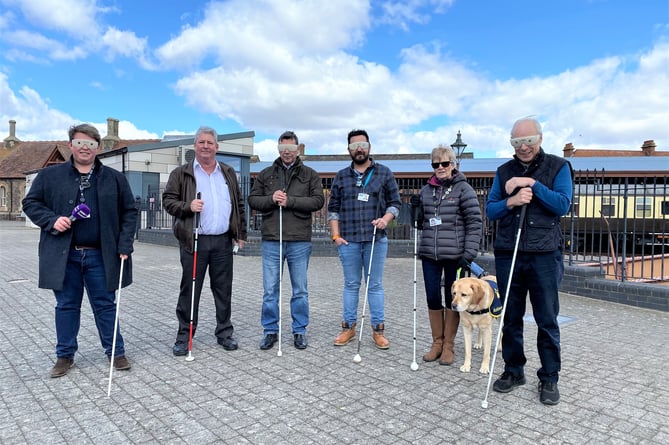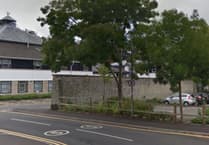DON’T leave trip hazards on the street where visually impaired and blind people can walk into them.
That was the simple message from campaigners when volunteers with good sight had the chance to experience a ‘blind walkabout’ in Minehead’s streets last Friday.
The volunteers included local MP Ian Liddell-Grainger and a registered blind local woman with her retired guide dog, Leo.
Experience of what is involved in not having normal sight was made possible by the RNIB (Royal National Institute for Blind People) regional campaign officer Steve Hyde, who fitted volunteers with special goggles which replicated sight disabilities such as macular degeneration.
Mr Hyde also gave each walker a scanning walking stick the visually impaired use to check for hazards ahead.
The volunteers said the goggles reduced vision to a small hole to look through. Mr Hyde explained: “People don’t realise what hazards are faced by those with the many forms of sight loss.”
He said that just walking along a typical high street involved having to navigate such hazards as plant pots, concrete benches and e-scooters.
He added that the objective of the blind walkabout was to make the general public aware of these trip hazards in the built environment. “People can help by thinking about where they park e-scooters and other obstructions,” he said.
Mr Liddell-Grainger said: “Wearing these special goggles and trying to navigate an average street demonstrates what problems the visually-impaired face whenever they go out.”
He added: “Just simple things can reduce the problem - like changing the colour of concrete benches so they are not camouflaged and people don’t fall over them.”
He said high streets could be a nightmare for the visually impaired. “The message I want to stress is we can all work towards making life safer and simpler for the visually-impaired so that they can do the things we do, and stay safe.”
Mr Hyde explained the basic problems faced by the visually impaired. “It’s not black and white, but many shades of grey with many different conditions such as macular degeneration affecting those with different levels of visual impairment,” he said.
Among volunteers wearing the ‘blind goggles’ was Somerset West and Taunton Council officer Franc Parreira, who said the council was doing its part by making sure the built environment - such as parking bays for e-scooters - did not cause problems.
He added: “The most important message to the general public is that they can help by making sure that temporary signs and displays don’t cause a trip problem.”
Walking with the group was Sue Taylor, a local resident representing the charity Guide Dogs, who said that since losing her sight 32 years ago, her guide dog, Leo, had turned her life around.
“At first, I thought losing my sight was the end of my life, but Leo, who is now retired but still a constant companion, has given me back my independence and confidence,” she said.
Mrs Taylor, who campaigns for Guide Dogs in West Somerset, added: “Those suffering visual impairment must remember there is help out there for everyone.”




